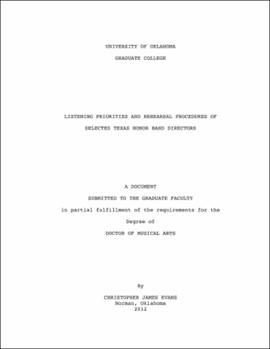| dc.contributor.advisor | Wakefield, William K | |
| dc.creator | Evans, Christopher James | |
| dc.date.accessioned | 2019-04-27T21:29:43Z | |
| dc.date.available | 2019-04-27T21:29:43Z | |
| dc.date.issued | 2012 | |
| dc.identifier | 99237942102042 | |
| dc.identifier.uri | https://hdl.handle.net/11244/318831 | |
| dc.description.abstract | This document seeks to determine if the selected Texas Honor Band directors prioritize musical elements while rehearsing their ensembles, resulting in a listening hierarchy. A secondary goal is to determine to what extent this influences their rehearsal processes. Through personal interviews, it is apparent that a large amount of intuitive teaching takes place in the participants' classrooms. Perhaps the most revealing insight that the research provides is in the area of student responsibility for the ensemble sound. While this was not an original intent of the research, the research design began with broad questions so that emergent themes not previously considered could be explored. Each of these teachers discusses how they are able to engage their students' critical listening skills in order to help them achieve a high level of musicianship. | |
| dc.format.extent | 204 pages | |
| dc.format.medium | application.pdf | |
| dc.language | en_US | |
| dc.relation.requires | Adobe Acrobat Reader | |
| dc.subject | Music--Instruction and study | |
| dc.subject | Conducting | |
| dc.subject | Ear training | |
| dc.title | Listening Priorities and Rehearsal Procedures of Selected Texas Honor Band Directors | |
| dc.type | text | |
| dc.type | document | |
| dc.thesis.degree | D.M.A. | |
| ou.group | Weitzenhoffer Family College of Fine Arts::School of Music | |
